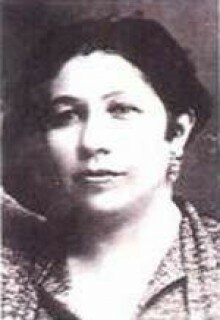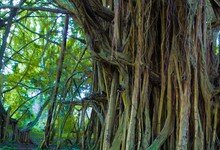
Esther Raab (1894-1981) is often touted as Israel’s first native-born woman poet, with the accent on her being native-born. That is, the fact that she was born in Ottoman-ruled Palestine, 52 years before the founding of the state of Israel, and her attention to the landscape, are seen as her defining features. She is celebrated as a nature poet, said to be reflecting the Land of Israel as the new Jewish context – almost as if she simply mirrored what she saw. Nonetheless, or perhaps because of this, she has often been ignored in surveys of Hebrew poetry: her work is missing from T. Carmi’s seminal Penguin Book of Hebrew Verse (1981) and from both editions of The Modern Hebrew Poem Itself (1st ed. 1965; 2nd ed. 2003), an omission rectified, of course, in the definitive anthology of women’s poetry in Hebrew, The Defiant Muse (1999). Raab, whose poetry is thematically daring and technically innovative, surely deserves close attention.
In this issue, poet Dorit Weisman makes a case for the uniqueness of Raab’s approach to eroticism: Weisman notes that in different poems depicting sexual encounters between men and women, there may be found a woman who wields phallic symbols; one who appears as a seemingly paradoxically empowered handmaiden; one who refuses to make a home for a man and rejects his heavily depressed response; and one who is a brother-equal to her male partner. In addition, Raab depicts an encounter between two women who contain aspects of both sexes.
In poet Harold Schimmel’s introduction to his translations of Raab, he too focuses on Raab’s difference, saying that she “stands outside her contemporaries much in the way that Emily Dickinson stood outside mainstream New England poetry”. He notes that Raab’s poetic technique is “Dickinson-like” as evidenced in “quirky punctuation, her occasional obscurity (not difficulty), and her fractured grammar . . . She builds by means of discrete independent phrases with meanings attached and suspended, sometimes pointing both forward and backward”. About Raab’s nature imagery, Schimmel makes a statement that brings to mind American poet Marianne Moore: “Attention to the diminutive is a hallmark; Raab has an eye for insects (ants, winged ants, fleas, flies, biting flies, mosquitoes, wasps, crickets, butterflies, dung beetles, bees), for small creatures (frogs, lizards, hens) and common birds (house swallows, bunting, bee-eaters, swallow owls – there are no hoopoes, no peacocks in her poetry), for stray dogs and headless poppies.”
Hamutal Tsamir, lecturer in Hebrew literature at Ben Gurion University, analyses the political roots of Raab’s reception by Israeli literary critics to show why her attention to landscape is emphasised and her sexuality ignored. Raab’s closeness to nature, Tsamir shows, is used to support the idea of the naturalness of Zionism: an existence seemingly prior to politics, or one that justifies realpolitik. In order to do so, this sensual woman poet must seem universal – that is, male. “Only despite the fact that she is a woman – only by being perceived as a male poet, can Raab be seen as a universalist, and therefore, a true poet; and – as ‘one of us’ – joining those assembled in the appropriated national landscape [. . .] of the local-Israeli or cosmopolitan, modernist story of her literary generation, the generation of the [establishment of the] state of Israel. In other words, the disregard for Raab’s feminine gender is exactly the condition for her acceptance into the [Hebrew poetry] canon.”
Bibliography
Books published in Hebrew
Kimshonim (Thistles), poetry, Hedim, Tel Aviv, 1930
Shirei Esther Raab (Poems of Esther Raab), Tel Aviv, Massada, 1964
Tefilah Aharonah (Last Prayer), poetry, Tel Aviv, Am Oved, 1972
Gan She-Harav (A Garden Destroyed) prose and poetry, Tel Aviv, Tarmil, 1983
Kol Ha-Shirim (Collected Poems), Tel Aviv, Zmora Bitan, 1988
Books in translation: English
Thistles: Selected poems of Esther Raab, translated by Harold Schimmel, Jerusalem, Ibis, 2002
Books about Esther Raab
Ben-Ezer, Ehud, Yamim shel La’anah u-Dvash (Days of Gall and Honey), biography, Tel Aviv, Am Oved, 1998
Luz, Zvi. Shirat Esther Raab: Monographiyah (The Poetry of Esther Raab) monograph, Tel Aviv, Hakibbutz Hameuchad, 1997
Sponsored by POETRY PLACE







